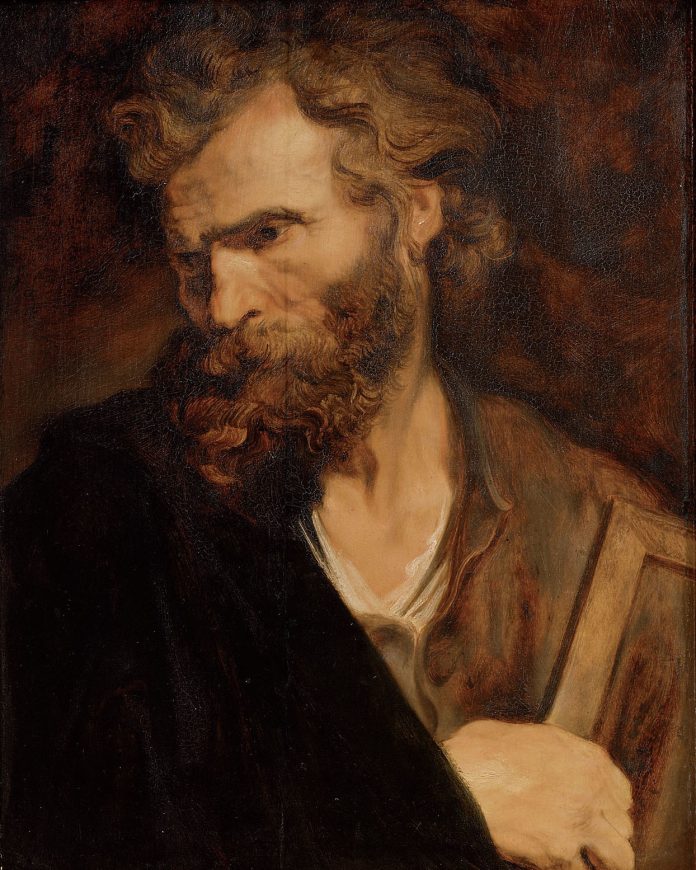All of the Apostles have a feast day, and on this 28th of October – the same day that Emperor Constantine won his victory over Maxentius at the battle of Milvian Bridge in 312 A.D., that Pope Saint John XXIII was elected, and that the Vatican II document Nostra Aetate on non-Christian religions was signed in 1965, which are all somehow related – we also celebrate Saints Simon and Jude, the latter, in particular, being invoked as the patron of desperate causes.
Simon was called the ‘Zealot’, which may refer to the fact that he belonged to the party dedicated to overthrowing Roman occupation of the Holy Land; or, perhaps, that he was ‘zealous’ in keeping the law of Moses. Either way, Christ channeled his zeal, directing it towards the salvation of souls and the building of His nascent Church. There is no gift, no energy, that God cannot use for his purpose, even if we are at first unwitting of the direction in which He takes our life. As the saying goes, God writes straight with crooked lines…
From the early centuries, Simon has always been connected with Saint Jude, or Thaddeus, author of a brief epistle in the New Testament – well worth a read, and it’s only a page or so long, but filled with truth presented in a way that is, shall we say, invigorating. Here is his description of those mired in sin and falsehood:
But these men revile whatever they do not understand, and by those things that they know by instinct as irrational animals do, they are destroyed. Woe to them! For they walk in the way of Cain, and abandon themselves for the sake of gain to Balaam’s error, and perish in Korah’s rebellion. These are blemishes on your love feasts, as they boldly carouse together, looking after themselves; waterless clouds, carried along by winds; fruitless trees in late autumn, twice dead, uprooted; wild waves of the sea, casting up the foam of their own shame; wandering stars for whom the nether gloom of darkness has been reserved for ever.
And he continues:
These are grumblers, malcontents, following their own passions, loud-mouthed boasters, flattering people to gain advantage. But you must remember, beloved, the predictions of the apostles of our Lord Jesus Christ; they said to you, “In the last time there will be scoffers, following their own ungodly passions.” It is these who set up divisions, worldly people, devoid of the Spirit.
Severe mercy, as they say – but what is mercy, without truth? And, remember, this is the Word of God, written through the mind and heart of the Apostle. And we should recall that these words apply to all of us in some way. Even if we are not mired, and do not rejoice, in the baser sins, we should say with some degree of fear and trepidation, that ‘there but for the grace of God go I’., and we must beg God to clear us of our hidden faults. We can hope that those on the not-so-merry road to hell know not what they do, and seek forgiveness and repentance, which are open to all, right up to their very last breath – and even a moment or two beyond.
Jude is clearly distinguished from the ‘other’ Jude, or Judas, ‘who betrayed Jesus’. Today’s Apostle Jude is also described as the ‘brother’ of Christ, with that term meaning any near relation; contrary to some Protestant revisionism, Jude was not the blood brother of Christ, for the obvious reason that it is a dogma of our Faith that Christ was miraculously conceived in the womb of the Virgin Mary, who had no other children.
Both Apostles, driven by their new-found zeal, according to tradition, preached the faith in the regions of Samaria, Mesopotamia, Libya, meeting their end together in a glorious martyrdom, likely in Persia. Their relics were brought back to Rome, where they rest under the basilica of Saint Peter’s, along with that of the first Pope.
Simon and Jude are often invoked as patron saints of desperate causes for which there seem no apparent solutions, of which we all have many in this increasingly fractious world, the form of which seems to be passing away before our very eyes. So seek their intercession, and channel all of our own desires to those of Christ, in Whom is all our hope.
Saints Simon and Jude, orate pro nobis!

